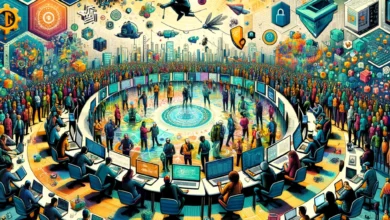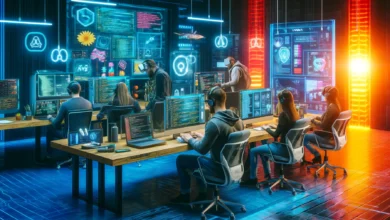Hacking Hollywood: A Bug Hunter's Guide to Cybersecurity Cinema
Exploring the Intersection of Bug Bounty Hunting and Movie Magic

In the labyrinth of modern cinema, the portrayal of hackers and cybersecurity professionals often oscillates between the wildly exaggerated and the surprisingly accurate. As we embark on this cinematic journey, we’ll explore how Hollywood interprets the enigmatic world of cybersecurity and bug bounty hunting. This exploration is not just an examination of factual representation but also a reflection of how popular culture shapes and is shaped by the ever-evolving domain of digital security.
The Artistic License in Cybersecurity Portrayals
Movies and TV shows have a long-standing tradition of dramatizing the realm of hacking and cybersecurity. This artistic rendition often paints hackers as modern-day digital cowboys, gallantly navigating the treacherous terrains of cyberspace. In our exploration, we will delve into classic films like WarGames and Hackers, which have become almost iconic in their portrayal of these digital vigilantes.
WarGames, a seminal film from the 1980s, introduced audiences to the thrilling possibility of a teenager accidentally hacking into military defense systems, nearly triggering World War III. This film, while steeped in the Cold War era’s technological anxieties, brought to the fore the concept of hacking not just as a tool for mischief but as a potentially world-altering activity. Despite its exaggerated plot, WarGames was pivotal in introducing the broader public to the concept of cybersecurity and its significance.
Moving to the flamboyant 1990s, Hackers took a more stylized approach. This film, replete with its portrayal of young, rebellious hackers, drenched in a cyberpunk aesthetic, brought a sense of adventure and defiance to the hacking culture. The characters, portrayed by a young ensemble cast including Angelina Jolie and Jonny Lee Miller, are seen battling against an evil corporation intent on causing ecological disaster. Hackers resonated with a generation for whom the internet was becoming a new frontier, symbolizing freedom and resistance against authority.
These films, while often straying far from the technical accuracy of real-world hacking and cybersecurity, captured the essence of the hacking ethos – curiosity, defiance, and a desire to explore and manipulate complex systems. They depicted hackers as individuals pushing the boundaries of technology, not for personal gain but as a statement against larger, often oppressive, systems.
However, it’s important to note the influence these portrayals have had on public perception. They often paint a picture of hackers as lone geniuses capable of single-handedly outsmarting powerful entities. While this serves the narrative and dramatic needs of cinema, it oversimplifies the realities of cybersecurity, which is a field marked by complex challenges, teamwork, and often, ethical dilemmas.
While the artistic license in cybersecurity portrayals in movies like WarGames and Hackers has led to some unrealistic representations, it has also played a significant role in popularizing the concept of hacking. These films have sparked curiosity and interest in the field of cybersecurity and have become cultural touchstones, embodying the spirit of a generation’s digital aspirations and fears. As we delve further into the intersection of bug bounty hunting and movie magic, it’s essential to appreciate these portrayals for their cultural impact and the conversations they have ignited about the digital world we inhabit.
Spotlight on Realism
In stark contrast to the often exaggerated portrayals of the hacking world, there exists a cadre of cinematic productions that have taken up the mantle of realism. Among these, Mr. Robot stands as a beacon of authenticity in the portrayal of hacking and cybersecurity. This critically acclaimed TV series has been widely praised for its accurate depiction of the technical and psychological aspects of the hacking world.
Mr. Robot, led by Rami Malek’s enigmatic performance as Elliot Alderson, delves into the complex life of a cybersecurity engineer and vigilante hacker. The show is a deep dive into the psyche of its protagonist and an accurate representation of the hacker subculture. It has garnered attention not just for its compelling narrative and character development but also for its technical authenticity. The series’ portrayal of hacking techniques, cybersecurity challenges, and the use of technology aligns closely with real-world practices, making it a standout in the genre.
The creators of Mr. Robot went to great lengths to ensure that the hacking depicted in the series was as realistic as possible. This commitment to authenticity involved consulting cybersecurity professionals and hackers to script accurate hacking scenes. The show accurately portrays the use of programming languages, the exploitation of security vulnerabilities, and the intricacies of network systems. For instance, rather than resorting to the common trope of fast-paced, flashy hacking scenes, Mr. Robot showcases the methodical and often tedious nature of real hacking, including the use of command-line interfaces and actual code.
Beyond the technical aspects, “Mr. Robot” also sheds light on the ethical and moral dilemmas faced by those in the cybersecurity field. It navigates the gray areas of digital privacy, corporate power, and the impact of technology on society. The show’s realistic approach brings to the forefront the challenges and responsibilities that come with the power of digital knowledge and the consequences of cyber warfare.
Furthermore, Mr. Robot has played a significant role in demystifying the field of cybersecurity. By presenting technically accurate scenarios, it educates its audience about the realities of hacking and cyber defense. It dispels the myth of the hacker as a solitary, hoodie-clad figure, instead portraying a more nuanced and realistic view of the cybersecurity community.
In conclusion, the spotlight on realism as exemplified by Mr. Robot represents a crucial shift in how cybersecurity and hacking are depicted in popular culture. This shift not only entertains but educates, offering viewers a glimpse into the actual techniques, challenges, and ethical considerations faced by cybersecurity professionals. As we continue to explore the intersection of bug bounty hunting and movie magic, productions like “Mr. Robot” serve as a reminder of the power of media to influence public understanding and perception of the digital world.
The Impact on Public Perception
The portrayal of cybersecurity and hacking in Hollywood has a profound impact on public perception, wielding a double-edged sword in shaping how these fields are viewed. On the one hand, the dramatization of hacking in movies and TV shows has played a significant role in popularizing the field, drawing public interest, and even inspiring future generations of cybersecurity professionals. On the other hand, these portrayals can also lead to widespread misconceptions and oversimplifications of the complex and nuanced world of cybersecurity.
Hollywood often depicts hackers as either lone geniuses who single-handedly outsmart massive corporations and government agencies or as nefarious villains using their skills for malevolent purposes. Such characterizations, while compelling for storytelling, do not accurately represent the real-world scenario. The truth is that the field of cybersecurity is diverse and collaborative, involving teams of professionals with a wide range of skills working together to secure digital assets and combat cyber threats. This community is not just about lone mavericks; it’s about collective effort and shared knowledge.
This skewed portrayal can lead to a misunderstanding of what cybersecurity work truly involves. Unlike the rapid, flashy hacking sequences often shown in movies, real cybersecurity work is meticulous, requiring patience, deep technical knowledge, and a strong ethical framework. The dramatization in media frequently overlooks these aspects, leading to a public perception that cybersecurity is all about thrilling, high-stakes digital battles, rather than a disciplined and strategic approach to protecting information.
Furthermore, the romanticization of the hacker persona can also obscure the serious nature of cyber threats. Cybersecurity is a critical field that deals with real-world consequences, from protecting sensitive personal information to securing national infrastructure. When the media portrays hacking as a glamorous and rebellious act without showing the ramifications, it can diminish the seriousness of cyber attacks and the importance of robust digital security measures.
In addition, these portrayals can influence how young, aspiring cybersecurity professionals perceive the field. The glamorized hacker image might attract individuals to the field for the wrong reasons or, conversely, portray it as too daunting or inaccessible for those who do not see themselves as fitting the Hollywood hacker stereotype.
While Hollywood’s dramatization of hacking and cybersecurity has brought attention and interest to the field, it also carries the responsibility of shaping public perception. As we delve deeper into the relationship between bug bounty hunting, cybersecurity, and cinema, it is essential to understand and address these media-driven misconceptions. Doing so will not only foster a more accurate understanding of the cybersecurity field but also encourage a more diverse and inclusive community of professionals dedicated to safeguarding our digital world.
Educational Value in Entertainment
Despite the artistic liberties often taken in the portrayal of cybersecurity and hacking in entertainment, there is an undeniable educational value embedded within these dramatizations. These portrayals, while they may not always be technically accurate, play a crucial role in sparking interest in the field, particularly among younger audiences. This section will highlight how certain movies and TV shows, despite their embellishments, can serve as valuable gateways to deeper interest and learning in cybersecurity and bug bounty hunting.
One of the most significant impacts of these cinematic portrayals is their ability to make the field of cybersecurity more accessible and appealing to a broader audience. Films and TV shows have the power to demystify the often-intimidating world of digital security, presenting it in a way that is engaging and intriguing. For example, a movie that showcases a hacker thwarting a cyberattack can pique a viewer’s curiosity about how such defenses are orchestrated in reality.
Additionally, these portrayals often introduce viewers to the basic concepts and terminologies of cybersecurity and hacking. While the scenarios may be exaggerated for dramatic effect, they still provide a glimpse into the world of digital threats, network security, and the importance of safeguarding data. For instance, a TV show that features characters using encryption to secure communications can lead viewers to explore the real-world applications of encryption technologies.
Furthermore, the representation of hacking and cybersecurity in entertainment can act as a catalyst for education and career exploration. Viewers, especially younger ones, may be inspired to research more about the field, leading them to educational resources, online courses, and, eventually, to career paths in cybersecurity and related fields. The excitement and intrigue generated by a suspenseful hacking scene in a movie can translate into a genuine interest in learning coding skills or understanding network security.
Several movies and shows, despite their dramatized narratives, offer a glimpse into the challenges and triumphs of cybersecurity work. For example, a film portraying a cybersecurity team racing against time to stop a cyber threat can highlight the collaborative and problem-solving aspects of the field. These aspects are critical components of cybersecurity and bug bounty hunting, where teamwork, analytical thinking, and creative problem-solving are key.
While it’s important to recognize the artistic embellishments present in Hollywood’s depiction of hacking and cybersecurity, it’s equally important to acknowledge the educational potential these portrayals hold. Movies and TV shows, with their wide reach and appeal, can be effective tools in introducing the masses to the fundamentals of cybersecurity, inspiring a new generation of enthusiasts to delve deeper into the field. As we continue to explore the intersection of entertainment and cybersecurity, it’s essential to leverage these portrayals as starting points for further exploration and learning in the dynamic world of digital security.
Recommendations for the Cybersecurity Enthusiast
As we navigate the intriguing intersection of cybersecurity and cinema, an exploration of this nature would indeed be incomplete without a curated list of recommendations. For enthusiasts who find themselves at this crossroad, fascinated by both the world of digital security and the allure of cinematic storytelling, we have compiled a list of must-watch movies and TV shows. This collection caters to a wide range of tastes, from those seeking the thrill of an exaggerated portrayal to others desiring a more technically accurate depiction of the cybersecurity realm.
- WarGames (1983): A classic that remains relevant today, WarGames is a thrilling tale of a young hacker who accidentally hacks into a U.S. military supercomputer. While it leans towards the realm of fantasy, the film is a pioneer in introducing the general audience to the concept of cybersecurity.
- Sneakers (1992): This film combines humor, suspense, and a bit of technological insight. It revolves around a group of security experts who find themselves entangled in a dangerous espionage plot. Sneakers is notable for its relatively realistic portrayal of cryptography and its implications.
- Hackers (1995): Although it takes artistic liberties, Hackers has become a cult classic. The film captures the spirit of the early internet and hacker subculture, making it a fun, if not entirely accurate, watch.
- The Matrix (1999): A landmark in science fiction and action, The Matrix blends cyberpunk with philosophical overtones. The film’s depiction of a simulated reality has sparked discussions about the nature of our digital world.
- Mr. Robot (TV Series, 2015-2019): Praised for its technical accuracy, Mr. Robot delves into the psyche of a cybersecurity engineer turned vigilante hacker. It’s a must-watch for its realistic portrayal of hacking and its impact on personal and societal levels.
- Blackhat (2015): Directed by Michael Mann, this film depicts cyber warfare and global hacking threats. While it has received mixed reviews, Blackhat offers a look into the world of cybercrime and the efforts to combat it.
- Who Am I: No System is Safe (2014): A German film that follows a young hacker who joins a subversive hacker group. The movie is well-regarded for its suspenseful narrative and exploration of hacking ethics.
- Person of Interest (TV Series, 2011-2016): This series explores the concept of surveillance, artificial intelligence, and cybersecurity. It’s a thought-provoking watch that combines elements of action, drama, and science fiction.
Each of these movies and TV shows offers a different perspective on the world of cybersecurity and hacking, ranging from the dramatized to the surprisingly realistic. They serve not only as entertainment but as conversation starters, offering insights into the complexities and ethical dilemmas of the digital age. For anyone keen on understanding the dynamic relationship between technology and society, or for those simply looking for an engaging story that resonates with the digital era, these recommendations are a great starting point.
Hollywood Hacking – Through the Bug Hunter’s Goggles
As we wrap up our cinematic journey through the portrayal of cybersecurity in Hollywood, it becomes evident that the depiction of hacking and digital security in films and TV shows is as multifaceted as the field of cybersecurity itself. While filmmakers often take artistic liberties for dramatic effect, these portrayals significantly influence public perception and foster interest in the intricate world of digital security.
This exploration into the realms of Hollywood hacking and cybersecurity reveals that there is often more than meets the eye. These portrayals, whether they lean towards the exaggerated or strive for accuracy, contribute to a broader understanding and appreciation of cybersecurity. They highlight the challenges, the innovations, and the ethical dilemmas faced by those in the field. From the exaggerated exploits of fictional hackers to the grounded reality of shows like “Mr. Robot,” each story offers a unique lens through which we can view the complex world of digital security.
So, as you enjoy these cinematic offerings, we encourage you to do so through the lens of a bug hunter. Let these films and TV shows inspire you, educate you, and even challenge your perceptions of what it means to be a cybersecurity enthusiast.
At BugBustersUnited, we are always keen to hear your thoughts and suggestions. How did these movies and shows shape your understanding of cybersecurity? Are there any other films or series you think should be on this list? Your insights and recommendations are invaluable to us and to our community. Share your thoughts, engage in discussions, and help us build a platform where the thrilling world of cybersecurity and the magic of cinema coalesce.
Whether you’re a seasoned cybersecurity professional, an aspiring bug hunter, or just a movie enthusiast intrigued by the digital world, there’s a wealth of knowledge and entertainment waiting for you in Hollywood’s portrayal of hacking. Grab your popcorn, settle in, and let these stories take you on a journey through the ever-evolving landscape of digital security, all from the comfort of your couch.




